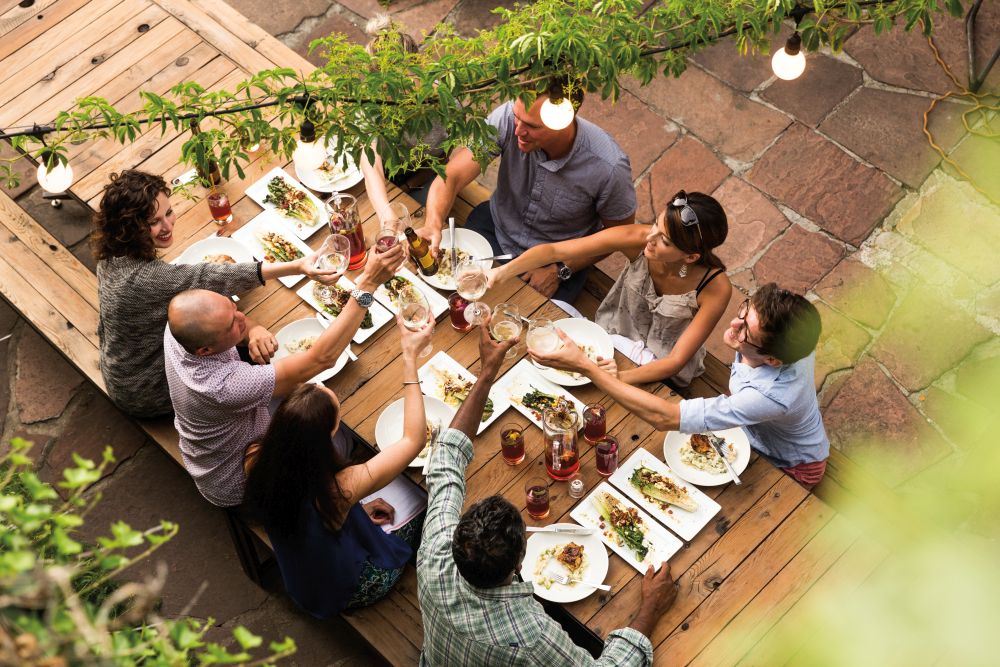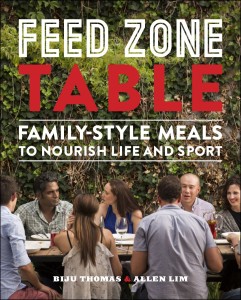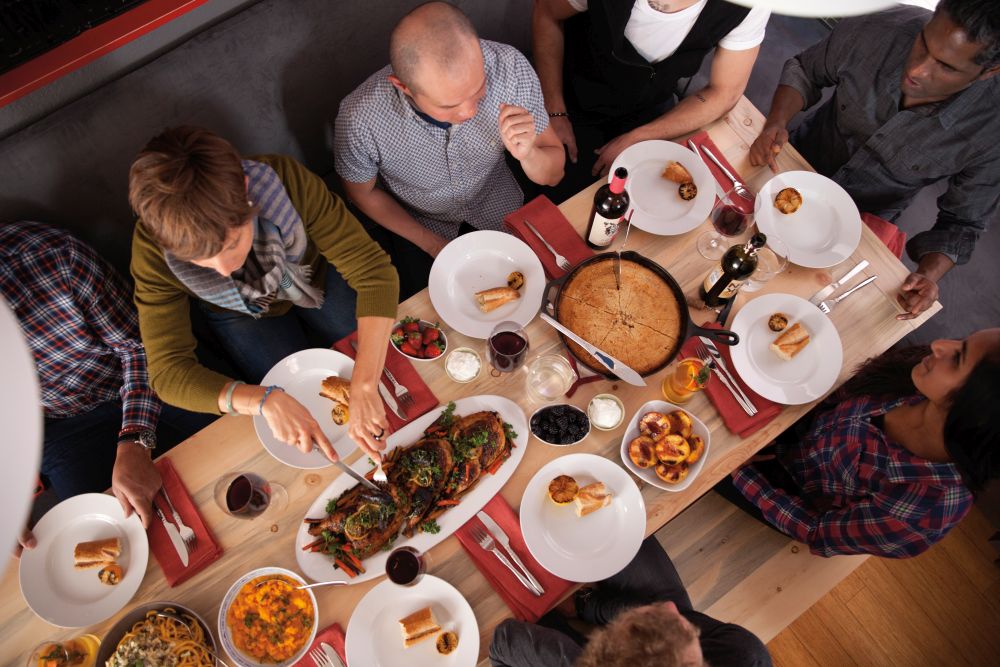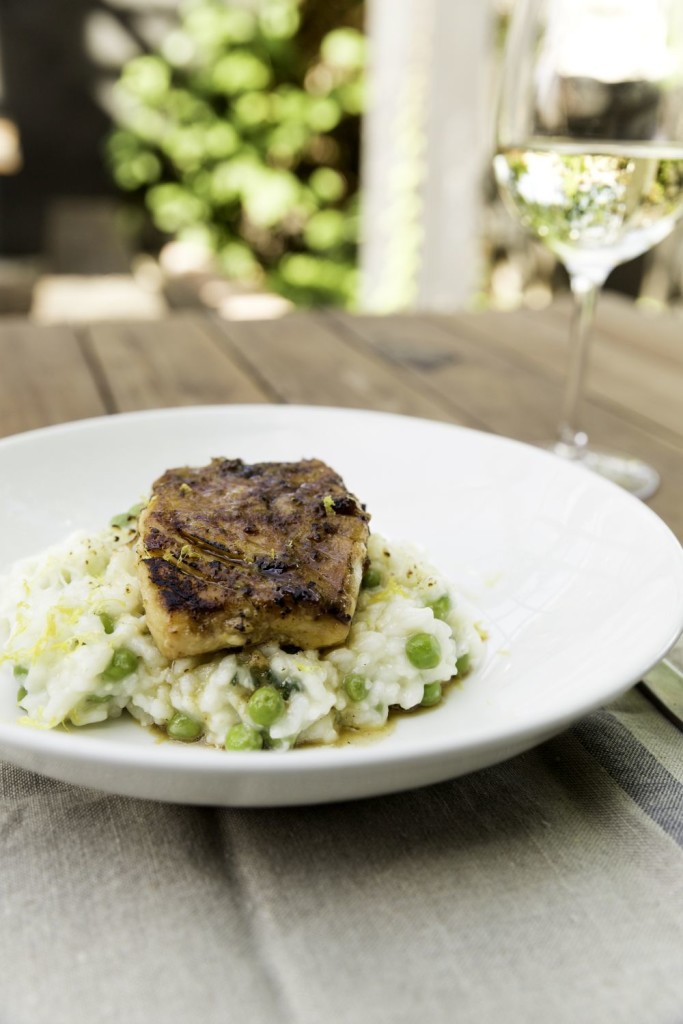Allen Lim, founder of Skratch Labs, talks about new recipe book and why athletes need to change their approach to eating

Think you’re approaching your run fueling the right way? One athlete and sports physiologist is out to prove you wrong. In fact, he’s written a book about it with recipes to solve all your nutrition problems.

As runners, most of us stress (to some degree) about what we eat. Running kilometre after kilometre brings on quite the appetite. Anyone who is regularly involved in endurance sports like running thinks about what to eat, when to eat it, what to avoid, how much to take in, etc. But Dr. Allen Lim, endurance athlete, coach, author, sports physiologist and founder of Skratch Labs, thinks that we are missing a key detail– the people who we eat with.
He believes that with all our fuss over the technicalities of sport nutrition, we as athletes have wound up alienating ourselves from the dinner table. The social aspect of eating together as a team or family has positive effects and we are overlooking their importance. He stresses the idea of eating real, home cooked food (which led to a past cook book by Lim) and doing so together. In a nutshell, he believes it’s not so much a matter of “You are what you eat” it’s more “You are who you eat with.”
 And he has now come out with a book revolving around these themes. Lim has teamed up with Chef Biju Thomas to come out with a new book titled Feed Zone Table: Family-Style Meals to Nourish Life and Sport. Their book is a result of life experience. During competition, Lim would often notice athletes eating poor-quality foods or packaged sports snacks. However when he started cooking real meals, athletes came together. Team dynamic improved, performance followed.
And he has now come out with a book revolving around these themes. Lim has teamed up with Chef Biju Thomas to come out with a new book titled Feed Zone Table: Family-Style Meals to Nourish Life and Sport. Their book is a result of life experience. During competition, Lim would often notice athletes eating poor-quality foods or packaged sports snacks. However when he started cooking real meals, athletes came together. Team dynamic improved, performance followed.
Feed Zone Table is more than just a recipe book. It comes with 250 pages of ideas for meals, snacks, drinks and sauces but with a 40-page introduction, runners can understand a bit about Lim’s back story as well as this approach to nutrition. In other words, it’s a cook book and a narrative rolled into one.
We had a chance to sit down with Lim and ask him about his new book, his thoughts on athletes’ diets, his experiences with food and sport and the importance of gathering at the dinner table.
Canadian Running: This is a different approach to a sport nutrition book in that it highlights the social element of eating. Tell us how this concept came to be.
Dr. Allen Lim: This cookbook is how things actually were in my career professionally. I got hired to work with very young professional cyclists. I was there to work on marginal gains, those little details that can make or break a performance. I realized that marginal gains don’t really matter when there are all these bottlenecks. One of the biggest ones was that many of these young, talented athletes didn’t have the basic life skills to take care of themselves. They’re living on their own and are just kind of lost. The other thing that I found is that they were really lonely.
I traded my sports science hat in for my home economics hat because I couldn’t talk to these kids about synthesis and the optimal macro nutrient combination if they were literally unable to make a bowl of rice. Teaching these athletes to cook, and cooking with one another sort of killed two birds with one stone. It taught them basic life skills and also to commune with one another. These endurance athletes were thinking that they had to have very specific diets to fuel their performance. The reality is that maybe the chemical fuel is less important than the social fuel. When we sat down at the table to bond as a team everyone just started doing better.

CR: A big theme that you’re trying to teach athletes is “You are who you eat with.” Explain this idea a little bit.
AL: There’s a lot of evidence that shows that things like cardiovascular disease, hypertension, diabetes and loneliness spread through communities in the same way that viruses spread, even though we know that you don’t just touch a lonely person and become lonely. If you become happy for some reason and you used to be sad, people within a one mile radius of you have a 25 per cent chance of being happier. Because we’re such social creatures, we adopt many habits and the lifestyles. For example, if your friends are active, you tend to be more active as well. If your friends are sad and gain weight, you’re probably going to get sad and gain weight as well. There’s this idea that one bad apple can ruin the bunch, and so if one person in your social network starts to have difficulty, people around them tend to have difficulty. If one person in your social network starts to do really well, that can be transmittable, too. The idea here is that the table and sitting with one another can help repair that and that it’s not just important from a performance standpoint but it’s also important from a general health perspective.
CR: You wrote a little bit about your own dysfunctional relationship with food. How might runners relate to that?
AL: For me, it was less about me feeling like there was anything wrong with what I ate, it was more that a lot of people gave me trouble about it. I think if there was any dysfunction, it was having all this negative expectation around how we were supposed to eat. All we really needed to do was get together and have a varied diet and to eat more whole foods and not be so dependent on pre-packaged foods. I really do believe that our bodies are really, really intelligent. What we suffer from is ignoring our own intuition.

CR: Tell us about how you were able to change up the way athletes ate at races.
AL: It was people trying to cook for hundreds of people. For the most part, it was served without love and care. But it sufficed. None of the athletes enjoyed themselves—everybody kind of left with a bad taste in their mouths, literally—but it was what the culture was, and it was cheap, and that was the easiest way to feed a big team.
That’s when we started realizing that we needed to bring our own chefs out to these big races. We needed to have our own cooking trucks and our own cooking facilities and we had to take more control over keeping things consistent. That helped a lot.
CR: What happens when athletes go for a more traditional approach with their diets?
AL: We were driven by performance, but we realized that sometimes some of the traditional approaches with respect to life and being human still work profoundly well. We were in effect kind of giving up our prepackaged energy bar for a beautifully-cooked meal. It came down to asking “What works the best?” Rather than having an expectation of, “This is *supposed* to work the best.” Certainly I do know that people have adopted our portable recipes, rice cakes, and eating real food as opposed to these liquid recovery drinks.
CR: Does this idea now seem like common sense?
AL: It is common sense! And I struggle with the fact that we’re trying to intellectualize something that is so simple. I sometimes laugh at myself for how complicated we’ve made it. We are extremely complex people, but we have extraordinarily simple needs.
CR: What about in a family meal setting? If one person is an athlete (and therefore eats like an athlete) but the rest are not, can they still enjoy dinner together?
AL: I don’t think that the table will necessarily push your agenda. What it does do is it gets people from different interests within the same family to sit down with one another and continue to be a family. It doesn’t mean that you need to have your spouse or your partner or your kids do the sports with you. It means you’re not going to have that sport or activity eliminate probably one of the most important interactions of the day for a family.
This interview has been edited for length and clarity. All photo republished with permission of VeloPress from Feed Zone Table by chef Biju Thomas and Dr. Allen Lim. Try more recipes at www.feedzonecookbook.com.


